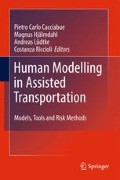Abstract
Background
In recent years, a variety of driver support and information management systems have been designed and implemented with the objective of improving safety as well as the performance of vehicles. While the crucial issues at a technical level have been mostly solved their consequences on driver activity remains open and needs to be fully explained. Of particular importance are their effects on driver behaviour and strategies, and their impact on the operation and safety of the traffic system. The aim of ITERATE (IT for Error Remediation And Trapping Emergencies) is to develop and validate a unified model of driver behaviour to be used in various applications concerning driver interaction with innovative technologies in emergency situations.
Method
This model will be applicable to and validated for all the surface transport modes (road, rail and water). A unified model of driver behaviour will be of great use when designing innovative technologies since it will allow for assessment and tuning of the systems in a safe and controllable environment. Such a model will be experimentally tested in large and small scale simulators and then validated for other modes transport and experimental platforms.
Results
The unified model of driver behaviour developed was used to design and set up a series of car and train driving experiments in five countries. However, experimental results are pending.
Conclusions
At the concept stage, the model could guide designers in identifying potential problem areas whist at the prototype stage, the model could inform on the scenarios to be used in system evaluation. In this way the systems will be better adapted to the drivers before being available on the market and will provide better support to the driver in emergency situations. Along the same lines, the model could be of use for authorities as a guide in assessing and approving innovative technologies without performing extensive simulator experiments or large scale field trials.
Access this chapter
Tax calculation will be finalised at checkout
Purchases are for personal use only
References
Barnard Y, Carsten O, Lai F (2010) From theoretical model to experimental data: a structured approach to design experiments to seed a model of vehicle operation with new systems. HMAT conference, Belgirate, Italy
Barnard Y, Lai F, Carsten O, Merat N, Hjälmdahl M, Dukic T, Vanderhaegen F, Polet P, Enjalbert S, Hasewinkel H, Lützhöft M, Kircher A Kecklund L, Dimgård M (2010) Selection of operator support systems across modes ITERATE Deliverable 2.2
Barnard Y, Lai F, Carsten O, Merat N, Hjälmdahl M, Dukic T, Wallén Warner H, Enjalbert S, Vanderhaegen F, Pichon M (2010) Specification of test procedures for the simulator experiments. ITERATE Deliverable 3.1
Enjalbert S, Vanderhaegen F, Pichon M, Ouedraogo KA, Millot P (2010) Assessment of transportation system resilience. HMAT conference, Belgirate, Italy
Lai F, Barnard Y, Merat N, Carsten O, Lutzhoft M Kecklund L, Enjalbert S Vanderhaegen F, Pichon M (2010) Review of existing technologies and systems supporting the operator. ITERATE Deliverable 2.1
Oppenheim I, Shinar D, Carsten O, Barnard Y, Lai F, Vanderhaegen F, Polet P, Enjalbert S, Pichon M, Hasewinkel H, Lützhöft M, Kircher A, Kecklund L (2010) Critical review of models and parameters for Driver models in different surface transport systems and in different safety critical situations. ITERATE Deliverable 1.1
Oppenheim I, Shinar D, Enjalbert S, Dahyot R, Pichon M, Ouedraogo A, Lützhöft M Carsten O, Hjälmdahl M, Cacciabue C (2010) Critical state of the art and unified models of driver behaviour. ITERATE Deliverable 1.2
Sagberg F (2009) Age differences in car drivers’ hazard perception skills. A synthesis of results from two studies using a video-based test, TØI report 1015/2009, Oslo 2009, 16 pages Norwegian language
Shinar D, Oppenheim I (2010) Review of models of Driver Behaviour and development of a Unified Driver Behaviour model for driving in safety critical situations. HMAT conference, Belgirate, Italy
Tapani A (2010) Estimating traffic system wide impacts of driver assistance systems using traffic simulation. HMAT conference, Belgirate, Italy
Author information
Authors and Affiliations
Corresponding author
Editor information
Editors and Affiliations
Rights and permissions
Copyright information
© 2011 Springer-Verlag Italia Srl
About this paper
Cite this paper
Hjälmdahl, M., Shinar, D., Carsten, O., Peters, B. (2011). The ITERATE Project—Overview, Theoretical Framework and Validation. In: Cacciabue, P., Hjälmdahl, M., Luedtke, A., Riccioli, C. (eds) Human Modelling in Assisted Transportation. Springer, Milano. https://doi.org/10.1007/978-88-470-1821-1_10
Download citation
DOI: https://doi.org/10.1007/978-88-470-1821-1_10
Published:
Publisher Name: Springer, Milano
Print ISBN: 978-88-470-1820-4
Online ISBN: 978-88-470-1821-1
eBook Packages: EngineeringEngineering (R0)

